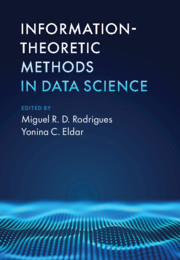Book contents
- Frontmatter
- Dedication
- Contents
- Preface
- Notation
- Contributors
- 1 Introduction to Information Theory and Data Science.
- 2 An Information-Theoretic Approach to Analog-to-Digital Compression
- 3 Compressed Sensing via Compression Codes
- 4 Information-Theoretic Bounds on Sketching
- 5 Sample Complexity Bounds for Dictionary Learning from Vector- and Tensor-Valued Data
- 6 Uncertainty Relations and Sparse Signal Recovery
- 7 Understanding Phase Transitions via Mutual Information and MMSE
- 8 Computing Choice: Learning Distributions over Permutations
- 9 Universal Clustering
- 10 Information-Theoretic Stability and Generalization
- 11 Information Bottleneck and Representation Learning
- 12 Fundamental Limits in Model Selection for Modern Data Analysis
- 13 Statistical Problems with Planted Structures: Information-Theoretical and Computational Limits
- 14 Distributed Statistical Inference with Compressed Data
- 15 Network Functional Compression
- 16 An Introductory Guide to Fano’s Inequality with Applications in Statistical Estimation
- Index
- References
9 - Universal Clustering
Published online by Cambridge University Press: 22 March 2021
- Frontmatter
- Dedication
- Contents
- Preface
- Notation
- Contributors
- 1 Introduction to Information Theory and Data Science.
- 2 An Information-Theoretic Approach to Analog-to-Digital Compression
- 3 Compressed Sensing via Compression Codes
- 4 Information-Theoretic Bounds on Sketching
- 5 Sample Complexity Bounds for Dictionary Learning from Vector- and Tensor-Valued Data
- 6 Uncertainty Relations and Sparse Signal Recovery
- 7 Understanding Phase Transitions via Mutual Information and MMSE
- 8 Computing Choice: Learning Distributions over Permutations
- 9 Universal Clustering
- 10 Information-Theoretic Stability and Generalization
- 11 Information Bottleneck and Representation Learning
- 12 Fundamental Limits in Model Selection for Modern Data Analysis
- 13 Statistical Problems with Planted Structures: Information-Theoretical and Computational Limits
- 14 Distributed Statistical Inference with Compressed Data
- 15 Network Functional Compression
- 16 An Introductory Guide to Fano’s Inequality with Applications in Statistical Estimation
- Index
- References
Summary
Clustering is a general term for techniques that, given a set of objects, aim to select those that are closer to one another than to the rest, according to a chosen notion of closeness. It is an unsupervised-learning problem since objects are not externally labeled by category. Much effort has been expended on finding natural mathematical definitions of closeness and then developing/evaluating algorithms in these terms. Many have argued that there is no domain-independent mathematical notion of similarity but that it is context-dependent; categories are perhaps natural in that people can evaluate them when they see them. Some have dismissed the problem of unsupervised learning in favor of supervised learning, saying it is not a powerful natural phenomenon. Yet, most learning is unsupervised. We largely learn how to think through categories by observing the world in its unlabeled state. Drawing on universal information theory, we ask whether there are universal approaches to unsupervised clustering. In particular, we consider instances wherein the ground-truth clusters are defined by the unknown statistics governing the data to be clustered.
Information
- Type
- Chapter
- Information
- Information-Theoretic Methods in Data Science , pp. 263 - 301Publisher: Cambridge University PressPrint publication year: 2021
